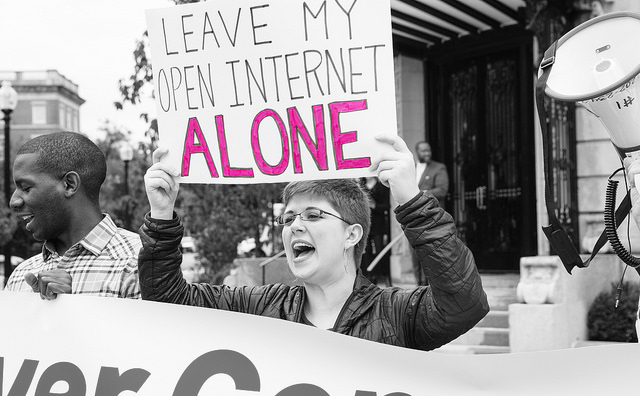
Free Press to FCC Chairman Aji Pai: Title II Net Neutrality Is Working
The fight at the FCC over the open internet rules is far from over — but we have passed a few key milestones. These kinds of rulemaking proceedings at the agency usually have two rounds of comments, for initial submissions and replies. Just before Labor Day, Free Press and millions of other pro-Net Neutrality activists submitted our reply comments in this latest proceeding.
The Trump FCC’s proposal to undo the strong rules adopted in 2015 (which we explained here) is bad news for the free and open internet and the millions of people who rely on it. Chairman Pai is laying the groundwork to roll back even the bright-line rules preventing throttling, blocking, paid prioritization, and other unreasonably discriminatory and harmful practices by ISPs. Even if he stops short of ripping those rules away, he’s dead-set on upending their legal authority and foundation. Either of these paths would mean ending Net Neutrality as we know it.
We’ve heard stories from people who love and rely on open internet access in countless ways and, make no mistake, rolling back the existing Net Neutrality rules would harm them. The rules allow entrepreneurs to compete in the online marketplace without having to cough up extra fees to ISPs to reach their customers. They make it so that people of color working to create a society in which their lives matter do not have to worry about having their voices blocked by broadband providers. And they ensure that these providers don’t have the power to block the lawful content and speech of activists, dissidents and speakers of all political stripes.
Here’s what the Chairman refuses to admit: by every conceivable measure Title II Net Neutrality is working. There’s no real partisan divide or controversy about the need for Net Neutrality outside of Washington’s political circles and lobbying shops. In our reply to the FCC and telcos like AT&T, Comcast and Verizon, we once again explained the history and importance of the Net Neutrality protections that fostered innovation and investment throughout the last twenty years — both before and after they were put on the right legal footing in 2015. We took down the ludicrous claims of companies like AT&T that they do not provide telecommunications services to the public. And we showed how at every turn these companies have telegraphed their intentions to thwart the Net Neutrality rules and offer worse service if the rules are overturned.
The millions of comments in this proceeding is what it looks like when real people understand the stakes of policy decisions in Washington and participate in our democracy. In his crusade to roll back the rules Chairman Pai has chosen to ignore all available evidence about broadband deployment and ISP spending, along with millions of comments from the public. He hasn’t been able to state a single logical reason why the existing Title II Net Neutrality rules should be overturned. The Commission should wake up and listen, instead of refusing to address irregularities in the public commenting process while resorting to gimmicks to delegitimize and squelch the voices of concerned people.
Though this phase of the public comment period at the FCC is over, the fight to protect Net Neutrality isn’t. Chairman Pai’s disregard of the public’s voice may open the Commission up to a serious legal challenge against any potential repeal. In the meantime, we’ll keep delivering your comments and our legal arguments to Pai and the other commissioners. Congress has a role to play, too, and could send an unequivocal message to the FCC that the rules ought to stay in place if we manage to break through the partisanship there. To save the open internet, we must continue to make sure our voices are heard at the FCC, in Congress and on the streets. And that’s exactly what Free Press intends to do.